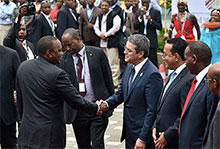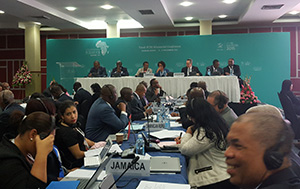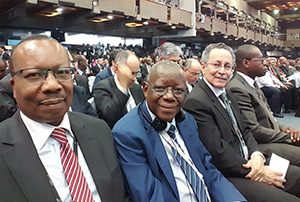ACP countries determined not to “bury” Doha Agenda in Nairobi
 Nairobi, 17 December 2015/ ACP: African, Caribbean and Pacific countries join more than 160 delegations from around the world in the Kenyan capital Nairobi this week, to thrash out details of major global trade deals at the 10th ministerial conference (MC10) of the World Trade Organisation.
Nairobi, 17 December 2015/ ACP: African, Caribbean and Pacific countries join more than 160 delegations from around the world in the Kenyan capital Nairobi this week, to thrash out details of major global trade deals at the 10th ministerial conference (MC10) of the World Trade Organisation.
The conference – the highest decision making body of the WTO – has been well-known for stalemates and difficulties, where developed and developing countries are often on opposite sides of the table.
As the Nairobi talks extend into the night in its final days, one message is clear from the developing world, including the 79 countries of the ACP Group of States: The outcome must be development-focused and the ‘Doha Development Agenda’ (DDA), which is centred on the interests of developing countries, must continue. This despite the lack of progress in the Doha round of negotiations since its launch in 2001.
“The choices are clear: reaffirm the Doha declaration or condemn it. For Africa, turning away from the Doha work programme and the broader Doha negotiations architecture on African soil is a highly unacceptable proposition. In fact a proposition of this nature devastates trust in the sphere of relations amongst States,” said Lesotho Trade and Industry Minister Hon. Joshua Setipa, addressing the conference on behalf of the Africa Group.
The sentiment was echoed across developing countries represented in Nairobi – for them, the negotiating positions taken by many of their industrialised counterparts renege on the commitment originally set out in the Doha ministerial declaration, which stated:
“We seek to place developing countries’ needs and interests at the heart of the Work Programme adopted in this Declaration… We shall continue to make positive efforts designed to ensure that developing countries, and especially the least-developed among them, secure a share in the growth of world trade commensurate with the needs of their economic development. In this context, enhanced market access, balanced rules, and well targeted, sustainably financed technical assistance and capacity-building programmes have important roles to play.”

Since this period of promise, which followed on the heels of the Millennium Declaration, negotiating details has been fraught with disagreements. While there is consensus, for instance, that a poor farmer in Kenya needs a boost to trade on a level playing field with competitors from developed nations, problems arise when this entails altering domestic policies in rich countries to cut subsidies to their own agriculture sector.
The rise of some developing countries to become ‘emerging economies’ has complicated issues further.
“The launch of the DDA fourteen years ago, was a momentous event in this organisation’s history, as it was the first time… that a negotiating round was entitled ‘a development round’,” recalled Hon. Maxine McClean, Minister of Foreign Affairs and Foreign Trade of Barbados, and the spokesperson for the ACP Group at the MC10 conference.
“Since then, few decisions taken, whether in quantum or substance, have reflected proposals from developing countries, including Least Developed Countries (LDCs) and Small Vulnerable Economies (SVEs). Many of these proposals in their initial form addressed the real needs of developing countries and were aimed at building our socio-economic development.”
Outstanding contentious issues still on the table this week include: agriculture; services; special and differentiated treatment, referring to special provisions made to support poorer countries in international trade; and economically meaningful decisions for LDCs. In March, the ACP Group tabled a number of proposals, including a development package for Nairobi, but few were taken up in the final draft outcome currently being considered.
It has also been particularly hard to get an agreement that would boost developing countries in efforts to industrialise, and even on market flexibilities granted to developing countries, including LDCs.

“We are therefore caught in the crossfire of a thematic battle launched by major players who bear the principal responsibility for the impasses in the negotiations over the last 9 years,” said Hon. McClean.
At the 10th ministerial meeting, the pressure is on to leave Nairobi with at least a declaration, if not a comprehensive development agreement. A no-outcome conference would send a damaging message for the future of the multilateral trading system, on the 20th anniversary of the WTO and on the first occasion a ministerial is held on the African continent.
However, as the Uganda Minister of Trade, Industry and Cooperatives, Hon. Amelia Kyambadde, told the conference: “[We] call for an outcome, but not any outcome, and not at any cost. We should not lose this opportunity to deliver for poor countries.”
At the very least, developing countries insist that MC10 allows the opportunity for the Doha Development Agenda to continue, until the remaining issues have been resolved in a balanced way.
(Photos from top: Kenya's President Uhuru Kenyatta greets WTO Director General Roberto Azevedo before opening the conference (Photo by WTO); ACP Group representatives strategise on common positions for negotiations; ACP delegation headed by ACP Secretary General (third from left) with Multilateral Trade Expert Mr. Morgan Githinji, Head of the ACP Geneva Office Mr. Marwa Kisiri, Assistant SG in charge of Trade and Sustainable Economic Development Mr. Viwanou Gnassounou)
– By Josephine Latu-Sanft, ACP Press Office
